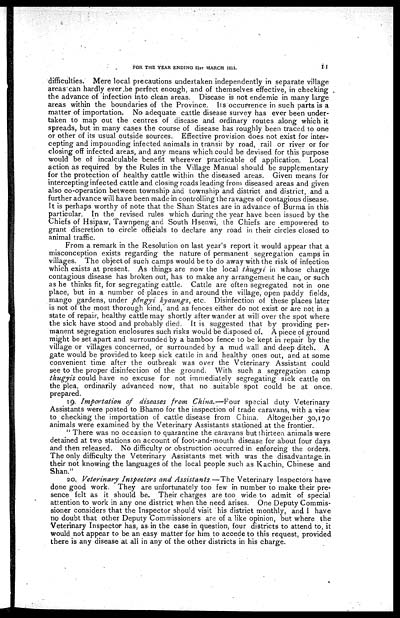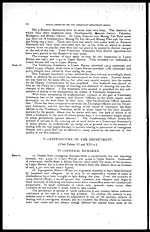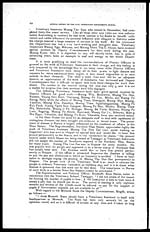Medicine - Veterinary > Civil Veterinary Departments > 1910-1941 - Annual report on the Civil Veterinary Department, Burma (including the Insein Veterinary School) > 1910-1922 > 1911
(70) Page 11
Download files
Individual page:
Thumbnail gallery: Grid view | List view

FOR THE YEAR ENDING 31st MARCH 1911. 11
difficulties. Mere local precautions undertaken independently in separate village
areascan hardly ever.be perfect enough, and of themselves effective, in checking
the advance of infection into clean areas. Disease is not endemic in many large
areas within the boundaries of the Province. Its occurrence in such parts is a
matter of importation. No adequate cattle disease survey has ever been under-
taken to map out the centres of disease and ordinary routes along which it
spreads, but in many cases the course of disease has roughly been traced to one
or other of its usual outside sources. Effective provision does not exist for inter-
cepting and impounding infected animals in transit by road, rail or river or for
closing off infected areas, and any means which could be devised for this purpose
would be of incalculable benefit wherever practicable of application. Local
action as required by the Rules in the Village Manual should be supplementary
for the protection of healthy cattle within the diseased areas. Given means for
intercepting infected cattle and closing roads leading from diseased areas and given
also co-operation between township and township and district and district, and a
further advance will have been made in controlling the ravages of contagious disease.
It is perhaps worthy of note that the Shan States are in advance of Burma in this
particular. In the revised rules which during the year have been issued by the
Chiefs of Hsipaw, Tawnpeng and South Hsenwi, the Chiefs are empowered to
grant discretion to circle officials to declare any road in their circles closed to
animal traffic.
From a remark in the Resolution on last year's report it would appear that a
misconception exists regarding the nature of permanent segregation camps in
villages. The object of such camps would be to do away with the risk of infection
which exists at present. As things are now the local thugyi in whose charge
contagious disease has broken out, has to make any arrangement he can, or such
as he thinks fit, for segregating cattle. Cattle are often segregated not in one
place, but in a number of places in and around the village, open paddy fields,
mango gardens, under pôngyi kyaungs, etc. Disinfection of these places later
is not of the most thorough kind, and as fences either do not exist or are not in a
state of repair, healthy cattle may shortly after wander at will over the spot where
the sick have stood and probably died. It is suggested that by providing per-
manent segregation enclosures such risks would be disposed of. A piece of ground
might be set apart and surrounded by a bamboo fence to be kept in repair by the
village or villages concerned, or surrounded by a mud wall and deep ditch. A
gate would be provided to keep sick cattle in and healthy ones out, and at some
convenient time after the outbreak was over the Veterinary Assistant could
see to the proper disinfection of the ground. With such a segregation camp
thugyis could have no excuse for not immediately segregating sick cattle on
the plea, ordinarily advanced now, that no suitable spot could be at once,
prepared.
19. Importation of diseases from China.—Four special duty Veterinary
Assistants were posted to Bhamo for the inspection of trade caravans, with a view
to checking the importation of cattle disease from China. Altogether 30,170
animals were examined by the Veterinary Assistants stationed at the frontier.
" There was no occasion to quarantine the caravans but thirteen animals were
detained at two stations on account of foot-and-mouth disease for about four days
and then released. No difficulty or obstruction occurred in enforcing the orders.
The only difficulty the Veterinary Assistants met with was the disadvantage, in
their not knowing the languages of the local people such as Kachin, Chinese and
Shan."
20. Veterinary Inspectors and Assistants—'The Veterinary Inspectors have
done good work. They are unfortunately too few in number to make their pre-
sence felt as it should be. Their charges are too wide to admit of special
attention to work in any one district when the need arises. One Deputy Commis-
sioner considers that the Inspector should visit his district monthly, and I have
no doubt that other Deputy Commissioners are of a like opinion, but where the
Veterinary Inspector has, as in the case in question, four districts to attend to, it
would not appear to be an easy matter for him to accede to this request, provided
there is any disease at all in any of the other districts in his charge.
Set display mode to: Large image | Zoom image | Transcription
Images and transcriptions on this page, including medium image downloads, may be used under the Creative Commons Attribution 4.0 International Licence unless otherwise stated. ![]()
| Permanent URL | https://digital.nls.uk/75773490 |
|---|




